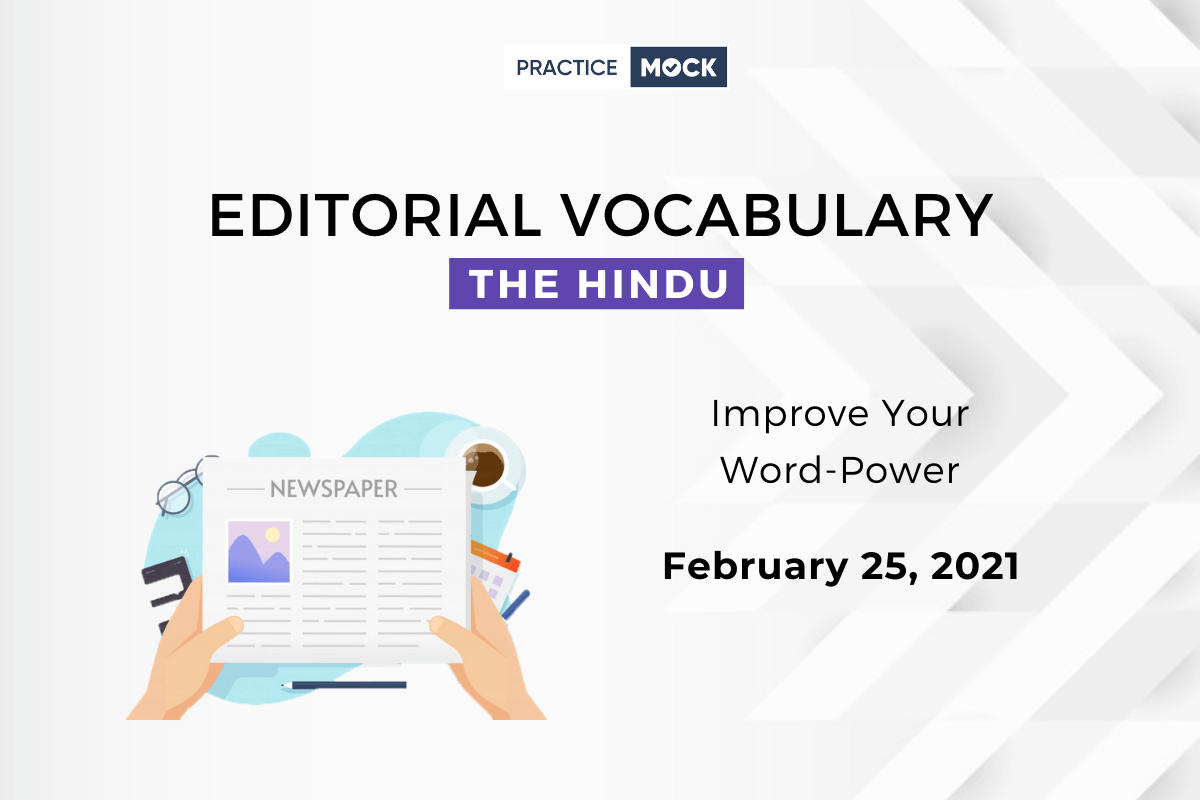Vocabulary plays an important role when it comes to solving the English language section. A good vocabulary not only increases your reading speed but it also helps you better understand the context. Not just that, in case there are any direct vocabulary questions, you can answer them effortlessly (obviously after considering the context). We have been coming up with editorial analysis to help you multiple your vocabulary on a regular basis. Here is today’s editorial where we have picked 10 difficult words/ phrases and their contexutal meanings. Have a look:
| Difficult Word/ Phrase | Contextual Meaning |
| Stringent | strict, precise, and exacting |
| Trump | beat (someone or something) by saying or doing something better |
| Invincible | too powerful to be defeated or overcome |
| Plight | an unpleasant condition, esp. a serious, sad, or difficult one |
| Back and forth | backward and forward |
| Watertight | so devised or planned as to be impossible to defeat, evade, or nullify |
| Embargo | an official ban on trade or other commercial activity with a particular country |
| Carve out | carve out something means to create or obtain something that helps you by skillful activities |
| Incarceration | the state of being confined in prison; |
| Octogenarian | a person who is from 80 to 89 years old |
Bail as right: On bail to Varavara Rao
Laws, however stringent (strict, precise, and exacting), cannot be allowed to trump (beat (someone or something) by saying or doing something better) basic rights
In granting bail for six months to poet Varavara Rao in the Bhima Koregaon case on medical grounds, the Bombay High Court has affirmed the principle that even the stringent provisions of an anti-terrorism law are not invincible (too powerful to be defeated or overcome) before a prisoner’s constitutional rights. Jailed under the draconian Unlawful Activities (Prevention) Act, Mr. Rao, 82, suffered from a host of ailments, and his condition was deteriorating until he was treated at the Nanavati Hospital on the intervention of the National Human Rights Commission. The court overruled the National Investigation Agency’s objection that bail should not be granted on medical grounds once an undertrial prisoner’s bail application was rejected on merits under UAPA, as long as access to treatment in a government hospital was available. The NIA had argued that in view of the statutory bar on granting bail under Section 43D(5) of the UAPA if the accusation against a person is prima facie true, any bail given on health grounds would open up the floodgates to similar petitions. The court looked at Mr. Rao’s plight (an unpleasant condition, esp. a serious, sad, or difficult one) from the perspective of his right to life under Article 21. It ruled that “a Constitutional Court cannot be a mute spectator to the undertrial being sent to prison and then to government hospitals, where his health deteriorates further, to be ultimately shifted to the Private Superspeciality Hospitals, upon intervention of courts…”. This could not continue back and forth (backward and forward) only because his bail application has been turned down on merits, it said.
Bail is routinely denied in most cases under UAPA. It became a watertight (so devised or planned as to be impossible to defeat, evade, or nullify) embargo (an official ban on trade or other commercial activity with a particular country) since the Supreme Court in 2019 gave a ruling that made it nearly impossible for anyone arrested under UAPA to be released on bail, unless the accused could demonstrate that the charges against them were prima facie untrue. However, a few recent judicial decisions have sought to carve out (carve out something means to create or obtain something that helps you by skillful activities) exceptions. The Supreme Court laid down recently that prolonged incarceration (the state of being confined in prison) without any possibility of an early completion of trial could be a ground for granting bail. In Mr. Rao’s case too, the High Court has noted that charges are yet to be framed, and 200 witnesses have to be examined once the trial begins. The temporary release of the octogenarian (a person who is from 80 to 89 years old) poet ought to turn public attention on the others incarcerated for a long time in the Bhima Koregaon case, in which lawyers and activists have been accused of plotting with Maoists to overthrow the government. Recent revelations that some of the electronic evidence in the case may have been planted remotely by a piece of malware have dented the prosecution’s claims about the existence of a plot. It is unfortunate that there is no sign of either an expeditious trial or any possibility of release of those arrested after a case of alleged provocative speeches made during a Dalit commemoration event held on December 31, 2017 in Pune, was transformed by the police into a sinister Maoist plot.
- Sign Up on Practicemock for Updated Current Affairs, Free Topic Tests and Free Mini Mocks
- Sign Up Here to Download Free Study Material
Free Mock Tests for the Upcoming Exams
- RRB PO 2024 Free Mock Test
- RRB Clerk 2024 Free Mock Test
- SSC MTS Free Mock Test
- SSC CHSL Free Mock Test
- SSC CGL Free Mock Test
- GATE Mechanical Free Mock Test
- GATE Civil Free Mock Test
- NABARD Gr. A Free Mock Test
- SBI Clerk Mains Free Mock Test
- SSC CPO Free Mock Test
- AFCAT Free Mock Test
- CAT Free Mock Test
- NIACL Assistant Free Mock Test
- UIIC AO Free Mock Test
- UIIC Assistant Free Mock Test
- GIC Assistant Manager Free Mock Test
- NICL AO Free Mock Test
- Free SSC Live Test
- UPSC CSAT Free Mock Test
- CDS-I Free Mock Test
- RRB ALP Free Mock Test


